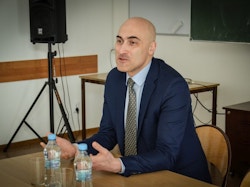What is the main aim of the Teaching and Learning Strategy Group?
Our main goal is to make our universities more collaborative, more integrated – and when you have 11 universities, cooperation can be challenging.
Mobility is the alliance’s biggest challenge from an educational perspective. Our proposition as an alliance is that students can move between our universities without barriers. Students could go anywhere among our 11 universities and continue their studies without any problems. But at the moment, mobility for all remains more theory than practice.
As an alliance, among the Teaching & Learning Strategy Group, I think we can solve this. We need to learn from each other how and what to do. This is just the beginning.
What excites you about this opportunity to work with fellow vice-rectors across our partner universities?
The opportunity to learn how other universities are solving problems appeals to me. In European universities, our challenges are more or less the same – 80 or 90 per cent similar. During COVID times, for example, when Uniwersytet Jagielloński was trying to develop regulations about exams and so on, we were studying how other universities across Europe were solving these problems. Through the Teaching and Learning Strategy Group, we can share good ideas with each other and learn from one another how to overcome challenges.
Becoming a vice-rector doesn’t mean you know everything. You’re a normal person like everyone else. You should learn – you must learn – from others, particularly from specialists and those more experienced than you. There are a lot of people I can learn from in the Teaching and Learning Strategy Group.
What does the future of education hold for Una Europa?
Micro-credentials are an important issue right now. In Poland, for example, our internal regulations are not ideal – we need good practices, we need examples. The meeting of the Teaching and Learning Strategy Group will be an excellent forum to exchange how and what to do in this area. Micro-credentials are likely to be a very important part of the alliance’s education strategy moving forward.
More broadly, one of the biggest challenges I see is the influence of artificial intelligence (AI) on education – what’s the future of the university? This is a really big issue for academic staff. For example, ChatGPT and plagiarism: our professors are asking what to do if they’re sure an assignment hasn’t been written by a student, but they don’t have any proof.
We can’t fight AI. We can’t forbid the use of Chat GPT. At this point, students probably know more about ChatGPT than academic staff. We should find a way to add AI to our curriculum. The question is how to do this in an effective way.
This is something I want to discuss with the other vice-rectors in the Teaching and Learning Strategy Group. This isn’t just an educational challenge; it’s a societal challenge.
Stay up to date with Una Europa's next steps towards a University of the Future:



